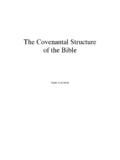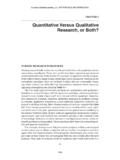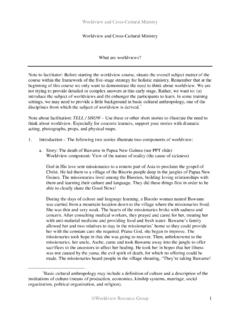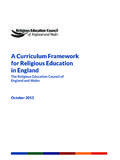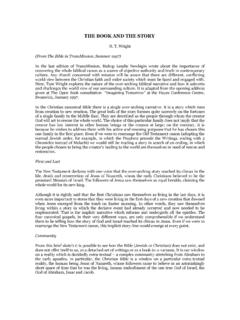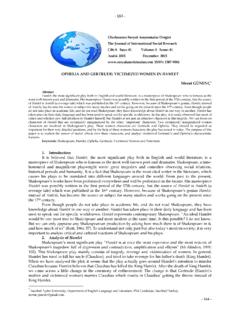Transcription of Worldviews and Culture - Berith.org
1 Worldviews and Culture : Interacting with Charles Kraft, N. T. Wright, & Scripture - 1 - Worldviews and Culture : Interacting with Charles Kraft, N. T. Wright, & Scripture by Ralph Allan Smith For me, as a missionary to Japan, the question of Culture is an inescapable and important issue. I am forced to confront my own cultural prejudices, consider the Culture of the Japanese, and ask myself what, as a Christian, I ought to think about all sorts of things that I would have taken for granted if I had remained at home in America. I am personally thankful that God called me to this land and that He has given me the opportunity to learn things that I would probably not have reflected on otherwise.
2 I am also, as a Christian minister very much aware of the importance of Culture for the future of our local church and the future of Christianity in Japan. For cultural matters have a profound impact. Cultural attitudes may bolster or belittle one s faith in Christ. Cultural beliefs and habits that we hardly take note of may advance our understanding of the Bible or blind us to obvious truths. With all of that in mind, in this short essay on Culture , I intend to interact briefly with the views of Charles Kraft since he is among the most influential missionary teachers, setting standards for the way missionaries and even theologians think about Culture and worldview .
3 It is my opinion that Kraft s basic notion of a worldview and his understanding of how Worldviews and cultures are to be related veer dangerously from the Biblical path. I hope that I can explain why I believe that to be the case and also to very briefly introduce N. T. Wright s approach to the question of worldview , which I believe to be more Biblical and helpful than Kraft s. I also offer some observations of my own. Charles Kraft In 1980, Carl F. H. Henry offered a devastating review of Charles H. Kraft s Christianity in Culture . Henry does not deny that Kraft intends to be an evangelical, true to the historical faith of the Church, but he demonstrates clearly and irrefutably that if Kraft really wishes to maintain the faithfulness to the truth that he professes, he will have to offer major revisions of his views of Christianity and Culture .
4 Henry s critique leaves little doubt about how deep and serious Charles Kraft s theological problems are. His article includes the following insights: Along with the anthropologist Monica Wilson, he insists that our ideas must change as societies change (Religion and the Transformation of Society [Cambridge: University Press, 1971] 5) an idea, presumably, that Wilson and Kraft consider impervious to change. Kraft indicates that no universal criteria are applicable to all cultures and that each Culture is valid only for its own participants (ibid. 49). None can be regarded as final, and no transcendently absolute criterion is allowed to judge any.
5 Kraft declares this belief in the Worldviews and Culture : Interacting with Charles Kraft, N. T. Wright, & Scripture - 2 - validity of other cultures to be the equivalent in anthropology of the Golden Rule in theology (ibid. 99). Yet cultural validity, Kraft says, does not oblige us to approve of customs like cannibalism, widow-burning, infanticide, polygamy and premarital sex (ibid. 50). On what basis can an emphasis on mere cultural validity identify any practices as universally wicked and sinful? Kraft writes of the American assumption that having sexual relations with someone other than one s first wife is adultery (ibid.)
6 6). If vices and virtues are conceptually untransferable from one cultural context to another, why should any or all be considered universally normative or abhorrent? But in any event he can provide no objective basis for approving monogamy, democracy, capitalism, self-determination, or military preparedness, above antithetical views, that is, polygamy, tyranny, communism, enslavement, or military weakness. While he writes of every Culture being in some respects stronger than others, the term stronger cannot reflect objective gradations of truth or morality. Kraft s assumptions provide no basis for regarding any Culture as either superior or inferior to any other.
7 God limits himself to the capacities of imperfect and imperfectible, finite, limited Culture , and has done so even in the incarnation of Christ (ibid. 115). God uses human language with all its finiteness, its relativity, and its assured misperception of infinity (ibid. 114, emphasis mine). If Kraft means what he here says, we should distrust his own claims about God and his relations. But Kraft is much more vocal about the infallibility of others than about his own. [A]ll human understandings of God s revelation and all behavior-responses are Culture -conditioned and none is to be considered universally valid or true (ibid.)
8 123). While Kraft insists on evaluation of cultural behavior, he holds that the meaning of that behavior is derived entirely from within the other s system, never from ours or from some cosmic pool or universal meanings (ibid. 124-125). The fact that God revealed some truths pertaining only to the Hebrews is invoked to justify the notion of the Culture -relativity of all revelational information (ibid. 126). Scriptural teachings are devalued as culturally conditioned while modern communication theories are assimilated to the revelation of the Spirit (ibid. 169fl.). Kraft warns us that the New Testament is largely phrased in Greek conceptual categories (rather than in supracultural categories) (ibid.
9 130). For Kraft, the functions and meanings behind the doctrinal forms hold priority. He leaves largely negotiable in terms of divergent cultural matrixes the cultural forms in which these constant functions are expressed (ibid. 118). There is, I believe, no absoluteness to the human formulation , he says, but the meaning conveyed by a particular is of primary concern to God (ibid. 118). Here Kraft deflates and relativizes the doctrines of the Bible and the creeds of Christendom. Meanwhile he presumes not only to articulate the supracultural mind of God, but to entrench his own debatable doctrine as the rule to which he accommodates all else.
10 He ranges Jesus against the Pharisees and against evangelical doctrinal orthodoxy and contends that Jesus considered beliefs and practices simply the cultural vehicles through which the eternal message of God is to be expressed and which must be continually updated to fulfill this function (ibid. 119). Worldviews and Culture : Interacting with Charles Kraft, N. T. Wright, & Scripture - 3 - No cultural symbols have exactly the same meanings in any two cultures (ibid. 138). Kraft apparently does not intend to say that his own use of cultural-symbols invalidates or precludes an understanding of his meaning; the meanings Kraft forges at Fuller Seminary presumably are The radical cultural relativism of Kraft s approach is apparent.
